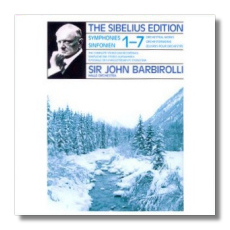
The Internet's Premier Classical Music Source
Related Links
- Sibelius Reviews
- Latest Reviews
- More Reviews
-
By Composer
-
Collections
DVD & Blu-ray
Books
Concert Reviews
Articles/Interviews
Software
Audio
Search Amazon
Recommended Links
Site News
 CD Review
CD Review
Jean Sibelius

Symphonies & Orchestral Music
- Kuolema: Valse triste, Op. 44 #1
- Pelléas et Mélisande, Op. 46
- #1, At the Castle Gate
- #2, Mélisande
- #7, At the Spinning Wheel
- #9, Death of Mélisande
- Pohjola's Daughter, Op. 49
- Rakastava, Op. 14
- Scènes historiques
- Op. 25 #1, All' overtura
- Op. 25 #2, Scena
- Op. 66 #1, The Hunt
- Finlandia, Op. 26
- Romance for Strings in C Major, Op. 42
- Suite Karelia, Op. 11
- Suite Lemminkäinen, Op. 22
- #3, Swan of Tuonela
- #4, Lemminkäinens Return
- Symphony #1 in E minor, Op. 39
- Symphony #2 in D Major, Op. 43
- Symphony #3 in C Major, Op. 52
- Symphony #4 in A minor, Op. 63
- Symphony #5 in E Flat Major, Op. 82
- Symphony #6 in D minor, Op. 104
- Symphony #7 in C Major, Op. 105
Hallé Orchestra/John Barbirolli
EMI Classics ZDME 67299 ADD 5 discs: 58:48, 78:21, 78:53, 72:11, 68:31
I have long awaited these releases. While there may be individual recordings here-and- there that I prefer over some of these, there is no better integral set of the orchestral music of Sibelius. There are also advantages to listening to a cycle from the same forces. As an analogy, imagine listening to Schubert's "Winterriese" with each song rendered by a different singer and pianist. Of course, no one would ever consider such a thing, and the analogy is not perfect. Still, we have here, as with any cycle, the chance to listen to a conception which has a consistency we should appreciate.
This recording of the 2nd Symphony is, plainly, the best I have heard since my baptism with Colin Davis and the Boston Symphony. (I was a classical neophyte and just happened upon this "new release" of somebody called Sibelius. The cover had a reproduction of "The Scream" and that attracted me, even though it was the first time I'd ever seen the painting. Anyway, I'd been cutting my teeth on Beethoven and that evening I put on the headphones to listen to this new stuff. I was sucked in and blown away at the same time.) Sorry about the digression. Comparing this with his ultimate recording, often rated as an audiophile choice, with the Royal Philharmonic, I find that I prefer the Hallé recording. Take the final movement, for example, at around 4:00 the strings on EMI has a feathery quality whereas the Royal Philharmonic Orchestra's sound is more clinical. Towards the end, around 10:00 more-or-less, the kettledrum beat is less rhythmic with the Hallé, lending to matters a less predictable, more mysterious atmosphere. That is, I truly prefer the earlier, EMI recording to the lauded Chesky one.
The recording of the 5th is, quite simply, the best I have heard. I would rank it above the lauded Rattle, Philharmonia recording, also on EMI. The sound, again, has some to do with my feelings. It is warm but detailed, the strings have a luster to them, a feathery quality. The tempo is just perfect and the tension exquisite. In fact, one evening as I was listening I noted, "I can imagine how the audience must have felt at the première of this piece, much as I did on my first listening. I want to jump up and applaud… but the kids are in bed."
The first symphony is not as good as Stokowski's final recording, but who cares? Not everyone will share my feelings about Stokowski, they are infidels of course, and I found Barbirolli's closing passage haunting. The second evoked memories of my first exploration into Sibelius' sound world. It was in 1976 or 77 that I saw an LP with "The Scream" on the cover. I had never heard of Sibelius, nor the painter for that matter, but picked up the disc out of curiosity. That night, headphones on, I was transfixed and transported into a classical sound I had never experienced before. Whereas Beethoven's canvas stretched across the mind, Sibelius' plumbed depths that blew me away. Not since then has a recording moved me as much as this one by Sir John. (For what it is worth, the earlier one was Colin Davis and the Boston Symphony).
I would say similar things about the remaining symphonies in this set. Adding the tone poems and other orchestral pieces is like icing on a cake. I read the recommendations in Gramophone recently. They suggest Simon Rattle's EMI set for collectors who want the symphonies whole. Frankly, Barbirolli's should now take pride of place. The sound is excellent and he brings other insights to Sibelius that I miss when I listen to Rattle.
Copyright © 2000, Robert Stumpf II


















